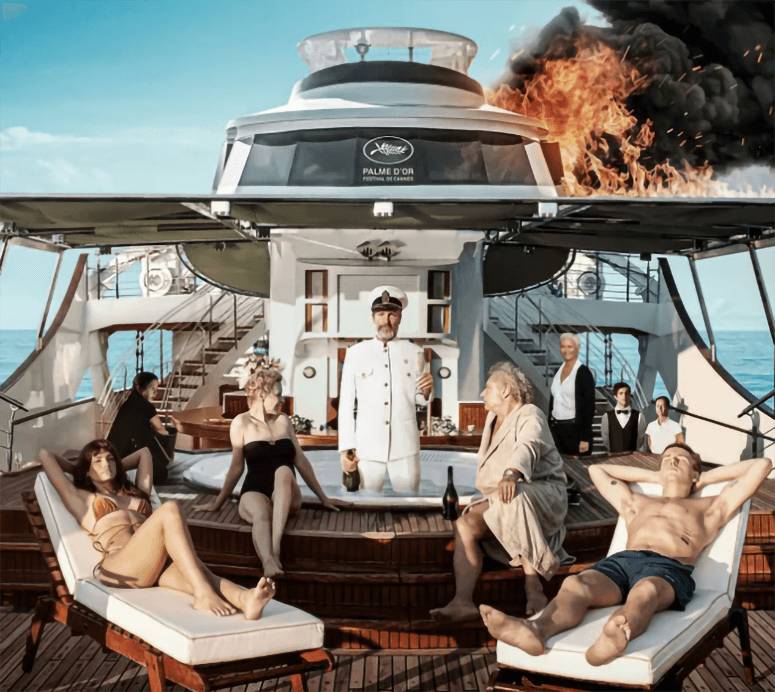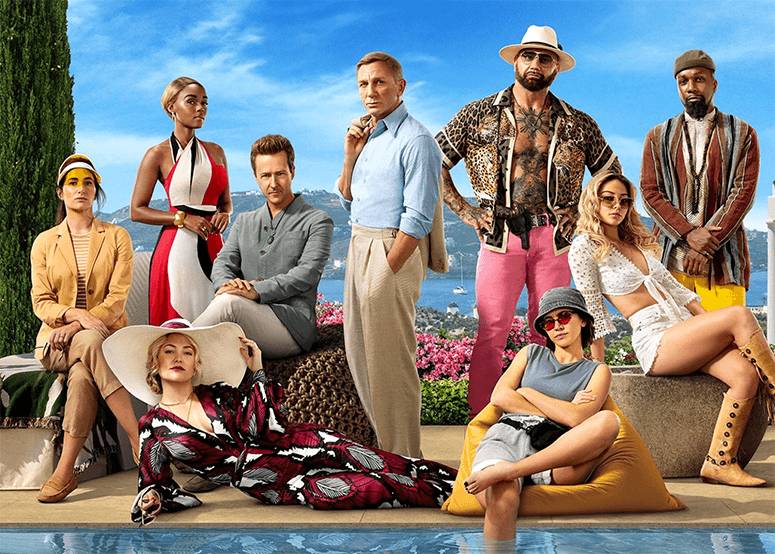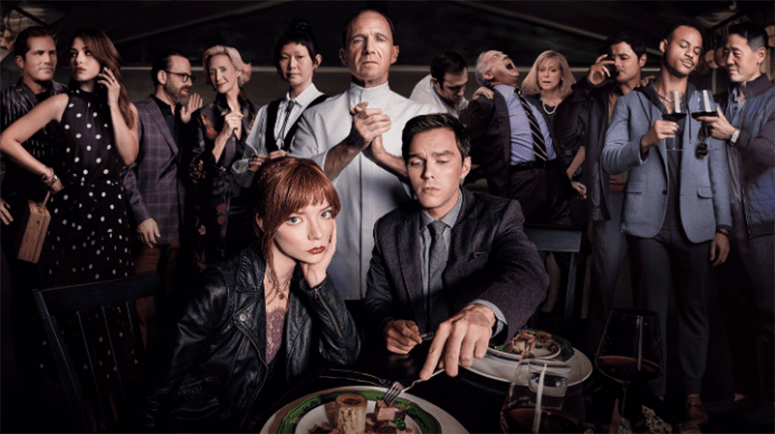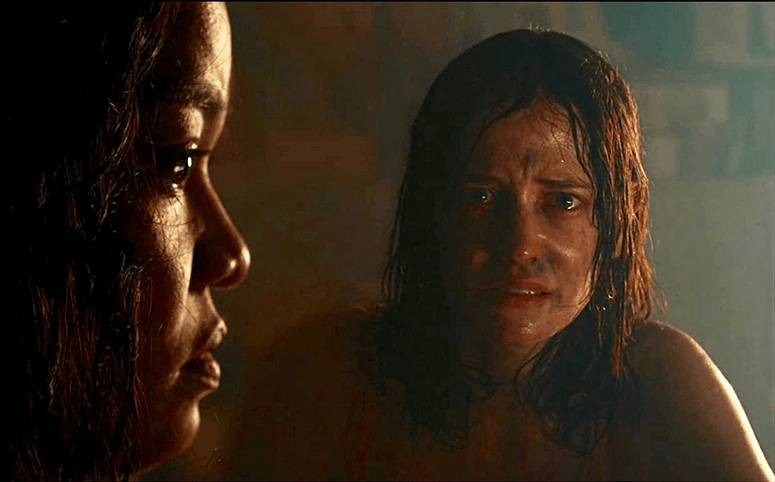The year of capsizing capitalism (on film)
If there was a theme to many movies in 2022, it was that rich people are very, very bad and that they will be made to suffer. Now, last year was about a lot of things, not least of all a sense of “revenge” in all activities—whether it was foreign travel, status purchases, splashy events, or simply thumbing a nose at COVID and its restrictions by posting selfie after selfie after selfie in crowded rooms. But in many ways, it was also about looking at the inequities that COVID and, indeed, much of the world’s direction seems to be lurching us. And it ain’t pretty.
You could start with Triangle of Sadness, which featured a strong supporting role from Dolly de Leon in Ruben Östlund’s three-part social satire on capitalism and gender politics. De Leon, who is still, we believe, in the running for SAG, Bafta, and Oscar awards, embodies the savvy, plucky survivor of the underclass in her role as “toilet steward” on Östlund’s ill-fated superyacht, populated with vivid specimens of unwarranted wealth — a veritable rogue’s gallery of shady characters, from Russian fertilizer peddlers who benefit from corruption to retired landmine manufacturers who spend their wealth on endless cruises, to vacuous social media influencers who are ascending the ladder of demi-success.

They all meet their comeuppance when the ship hits rough waters, as vomitus spreads throughout the dining room to an alarming degree— and we, the audience, are either disgusted, disturbed, or secretly gleeful that these wretched characters are now feeling, well, visibly wretched.
This schadenfreude seems justified, as these clearly are bad people. But it also amounts to shooting fish in a barrel, plucking at low-hanging fruit. Yes, the worst deserve the worst. But what we’re left with is a series of cinematic revenge fantasies against the very idea of having too much money. For our entertainment.

We could look at the Netflix film Glass Onion, a sequel to Rian Johnson’s Knives Out, again starring Daniel Craig as fastidious private eye Benoit Blanc, who accidentally summoned to a remote island where tech billionaire Miles Bron (Ed Norton) does his best impersonation of a bratty wealth-monger with faint whiffs of Elon Musk. The earlier Knives Out was itself a more direct indictment of class warfare—and perhaps less on-the-nose than the parade of despicable nouveau riche types on Bron’s island, which includes Kate Hudson and Dave Bautista.
What was the tipping point? Maybe, in the end, we all just wanted to be entertained. And the rich, like the poor, will always be with us to supply that very service.
Another 2022 example was the Mark Mylod black comedy The Menu, which features a pedigreed cast headed by Ralph Fiennes as celebrity chef Julian Slowik (employing one of Fiennes’ many non-specific East European accents). It’s a raucous sendup of the celebrity culinary scene, where a group of Chef’s Table fans shells out $1,250 per head for an “experience meal” prepared on yet another remote island. Slowik does not exactly hide his contempt and disdain for his loving fans—including Nicholas Hoult as an online food critic who truly drank the Kool-Aid, and his unsuspecting date, Anya Taylor-Joy. It becomes clear after a few dishes that this is not a smackdown of rarified eateries serving foams, “essences” and ambiance, but of its greedy and insistent clientele. The filthy rich idiots who take a boat to the island are shown not only to be receptive to barbed critiques from the increasingly sinister Slowik, but actually seem eager for punishment—almost as though they think they deserve it for being so gross and acquisitive.

In truth, Slowik’s restaurant Hawthorn seems modeled after Noma, the 3-Michelin star Copenhagen restaurant known for serving things like grilled reindeer heart on a bed of fresh pine, and which plans to shut down in 2024 because, as owner-chef René Redzepi puts it, it is “unsustainable” to create an assembly line of unique food experiences night after night. Clearly, Redzepi is taking a larger view of the industry itself, and its pampered dining population, who eagerly make reservations two to three years in advance for the chance to eat saffon ice cream served in a beeswax bowl.
The word “unsustainable” comes up a lot in relation to industries fueled by rich patrons, and that perhaps signals we are reaching a tipping point of outrageous wealth. Not just in moral-compass moments experienced by celebrity chefs, but in the fashion industry. This leads us to Nocebo, an Irish-Filipino thriller recently released here through TBA Studios. It stars Eva Green as a designer of kids’ fashion and Chai Fonacier as a Cebuano nanny who arrives on her Dublin doorstep to look after her young daughter after Green starts coming down with disturbing hallucinations involving maggot-covered canines, among other things.

The casual entitlement of Green’s mansion life is juxtaposed against the grinding (though well-lit) poverty of Manila’s downscale quarters. Turns out Green has been running a sweatshop in the Philippines to make her clothes on the cheap, and factory employee Fonacier has put the whammy on her using local folk medicine and spells. The revenge fantasy reaches a high pitch, with Green enacting 50 shades of freak-out as the rather insistent yaya Diane (Fonacier) circles in and takes over her life.
The have-nots taking over the lives of the haves was, of course, a theme that struck Oscar gold with Parasite, Bong Joon-ho’s 2019 South Korean black comedy that feasted on the rich, with a family of crafty cellar-dwellers finding their way inside a sleek upscale mansion and gradually replacing its inhabitants. (An interesting side note: Many well-off people I know who watched Parasite viewed the poor in the film as simply “leeches” and villains, completely missing any layers of irony which, admittedly, were not exactly subtly hidden in Joon-ho’s revenge fantasy.)
Did it all start with Parasite? Or did the constant stream of Netflix documentaries on grifters taking advantage of the gullible rich eager to believe in their schemes fuel this urge to take down—or, really, simply mock—capitalism? Was it the sight of Elon Musk playing with billions and people’s jobs like it was all a game of Monopoly that soured our perspectives on the ultra-rich? Was it the sight of Putin and his cronies’ superyachts lazing in ports as he invaded and decimated all of Ukraine? Or perhaps the specter of authoritarianism and kleptocracy is on the rise even in so-called democracies?
What was the tipping point?
Maybe, in the end, we all just wanted to be entertained. And the rich, like the poor, will always be with us to supply that very service.


